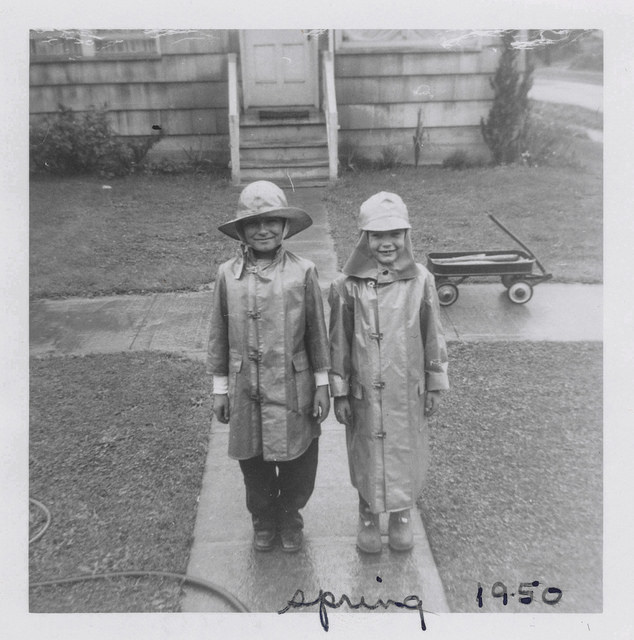
Warning: naughty language ahead!
~
“They fuck you up, your mum and dad.
They may not mean to, but they do
They fill you with the faults they had
And add some extra, just for you.”
They may not mean to, but they do
They fill you with the faults they had
And add some extra, just for you.”
~ Philip Larkin, “This Be The Verse”
~
Some clients arrive for their first therapy session skeptical, worried, or downright reluctant to talk about their childhoods.
I assure them I have no interest in getting them to do something they don’t want. Nevertheless, if they are willing, then I am curious—exploring their childhoods helps me to understand their concerns more fully. What they say is often something along the lines of:
“It feels indulgent, like I’m feeling sorry for myself when other people have had it so much worse.”
“That was then and this is now, and I don’t see how dwelling on the past can help me today.”
“I had a very happy childhood, and I don’t want to blame my parents.”
You probably don’t want to talk about your childhood because it fucked you up. And unprocessed childhood stuff can manifest as:
Negative Core Beliefs
The reasons given above are telling in themselves. Deeming oneself as “indulgent” suggests we have a critical inner voice. I could challenge you by asking, “What’s the problem with being ‘indulgent’ in your personal therapy session? What would that mean—to be seen as indulgent?”
Often, if we pursue the line of inquiry, it comes back to a fear of being somehow “wrong” or “unlikeable.” Childhood is often the time when these types of negative core beliefs are picked up.
Emotional Crises
Not wanting to dwell on the past might also mean we want to avoid difficult feelings. However, the fact that we are experiencing mental health issues in the present suggests that these difficult feelings, although avoided, are still around in a different form.
It is also highly likely that we use that same defence mechanism—of minimising our feelings by not dwelling on the past—in the present, too. We get angry but don’t say anything. We feel hurt but keep quiet. We feel scared but put on a brave face. This leads to a car-crash of emotions that pop up in unwieldy ways, such as panic attacks, violent outbursts, or floods of tears at inappropriate moments.
Self-Blame
The phrase, “I had a very happy childhood” coming from a client who is evidently suffering would make any good therapist’s ears prick up. It suggests a black and white, childlike way of categorising experiences as either very happy or very unhappy, with no room for grey areas.
What did you do, as a child, with experiences that didn’t fit into that category of “very happy?” After all, we cannot have been very happy all of the time, even with the best of parents.
Often, we have a strong sense that talking about our parents in a less than flattering way is wrong and makes us a “bad” daughter or son. We feel guilty for criticising our parents. We do not differentiate between our parents who may have had the best of intentions, and their behaviours, which may not always have been helpful, and could have been downright hurtful. We prefer to blame ourselves.

But if we don’t talk about it, we will likely remain fucked up.
According to Dr. Jeffrey Young, who devised Schema Therapy, our parents are responsible for providing: 1) nurturance, including reassurance, attention, affection, warmth, and companionship, 2) empathy,including understanding, interest, self-disclosure, and mutual sharing of feelings, and 3) protection,including strength, direction, and guidance.
Even in a household where the children grew into reasonably functional adults, they may have experienced parenting deficits.
I’ve worked with many clients who are very successful in several areas of life but suffer a highly critical inner voice, lack of self-esteem, high anxiety levels, or relationship black holes.
When exploring their childhoods, they discover that even if their parents meant well, something was missing in the quality of their relationships.
Perhaps nothing less than achieving 100 percent in school was acceptable, and the child would end up feeling “not good enough” if they came home with 95 percent. Maybe either or both parents found it difficult to express their own vulnerability, so the child grew up with no model about how to express emotions.
Perhaps one of the parents had a volatile temper so that even if their child felt protected most of the time, at other times they felt petrified around them. It may have been that one or both parents were so preoccupied with their own career that their child felt like an obligation on their to-do list rather than a person who they were genuinely interested to know.
So, here’s the thing: we need to talk about it.
It is only by recognising these relational deficits that we can identify where our negative core beliefs have come from and start to disentangle ourselves from them.
As adults, we now have the intellectual maturity—and perhaps the help of an outside therapist’s perspective—to recognise that just because our parent didn’t spend time with us, that didn’t mean we were unlovable. Just because our parent never seemed happy with anything less than 100 percent, that was their “stuff” and not ours, and did not make us “not good enough.” Just because our parent had a terrible temper and would say horrible stuff to us, that had absolutely nothing to do with us.
It’s about recognising that however we behaved as kids, our parents were the adults who were supposed to protect, nurture, and guide us. They could have loved us dearly and had the best of intentions, but this doesn’t mean we always felt like they were doing their job.
By identifying their behaviours rather than blaming them, and by challenging the negative core beliefs we unthinkingly picked up, we can also learn not to condemn ourselves in the here and now. We have less need to put up a front to others. We can be more open. We are more likely to put ourselves out there and recover more quickly when we fall.
To stop playing unhealthy patterns on repeat.
Sigmund Freud first coined the term “repetition compulsion.”
This refers to doing something over and over again due to an unfinished and subconscious experience from childhood that wants to be completed, or processed.
For example, if as a young child, we experienced feelings of abandonment, grief, loss, shock, and rage when one of our parents left the family home, what happened to these feelings? Let’s say we were under five. We might have cried or behaved differently, maybe stopped talking, become more withdrawn, or started wetting the bed. However, since we weren’t able to articulate our inner state so that an adult could sit down with us and help us to understand our feelings, our only way of coping was to suppress them.
And what if the person who evoked strong, difficult, and overwhelming feelings is also our main caregiver? The sarcastic mother’s cutting words chill her little girl’s heart, who, yearning for love, buries her shame to be her momma’s “good girl.” Children, terrorised by their violent father’s drinking binge, “forget” about their overwhelming powerlessness and helplessness when their dad apologises and says he’ll never do it again.
These feelings need to be processed just as rain drops need to fall, just as a pendulum needs to swing, just as an apple tree needs to grow apples.
This is what Gestalt Therapy theory calls “organismic regulation.” When we keep playing the same old unhealthy patterns, like falling in love with unavailable partners who abandon us, or marrying abusive partners where we feel trapped and powerless, or dating arseholes who treat us badly—those are our buried feelings stomping up and down, waving red-faced and screaming, “Wake the fuck up! Grab this opportunity to heal so you can start doing life differently.”
For this to happen, we need to talk about your childhood.
To feel more at peace in the present:
Coming back to those overwhelmingly difficult childhood feelings that were not processed, what happens when a current situation provokes the same feeling? How can we allow ourselves to feel it if we’ve never learned how? How can we get angry with someone when we’ve never learned how to “do” anger?
Some might reply that they don’t need to feel anger, but anger is a perfectly valid emotion and is as worthy and equal as any other emotion. It’s how we express it that can be problematic, not the emotion itself.
According to Gestalt Therapy theory, the function of emotions is to act as messengers. They let us know what it is we need and want from others and from ourselves. Once we know that, we can do something about it. So, if we do not acknowledge all of our emotions, we have a bit of a problem. It means that we limp through life without getting what we need. Depression and anxiety, among other symptoms, are the consequences of that lack of support.
Say, as a child, we didn’t allow ourselves to feel abandonment rage because it wasn’t acknowledged by anyone. It feels overwhelming and scary, so we bury it.
Then, our abandonment stuff gets triggered by a partner who says he is going on holiday with his family rather than us. The anger is there but we don’t allow ourselves to feel it. We feel anxious instead. Or we start to numb ourselves and withdraw from the relationship. Or we start to make cutting comments and become passive-aggressive.
We do anything rather than allow ourselves to feel anger, as that just feels way too risky. Thus, we don’t get to say, “I feel annoyed that you’re going on holiday with your family. It makes me think I’m not that important to you.”
Being able to say this could open up dialogue to find some kind of compromise or at least be assured that you are important to your partner. Taking the risk of expressing anger and having it well received gives you the new experience that expressing anger is okay. By not expressing it, you are playing by the old rules that you learned as a child—that getting angry got you nowhere, it was futile, and it tended to boomerang back onto you.
This goes for other feelings too. For example, and without wanting to oversimplify, buried shame can lead to perfectionism and being hyper-critical. Buried fear might manifest as obsessive compulsive disorder and controlling behaviour. Suppressed grief is often linked to depression.
The idea of allowing these feelings is scary because they were scary when we were children. However, taking the risk of allowing them in the present leads to feeling all the other “child-like” feelings that might have also been suppressed. such as joy, excitement, courage, and a sense of empowerment.
“Man hands on misery to man.
It deepens like a coastal shelf.
Get out as early as you can”
It deepens like a coastal shelf.
Get out as early as you can”
So, like Philip Larkin, I suggest you get the hell out of misery as early as you can and to do that, let’s sit down and talk!
~
~

No comments:
Post a Comment